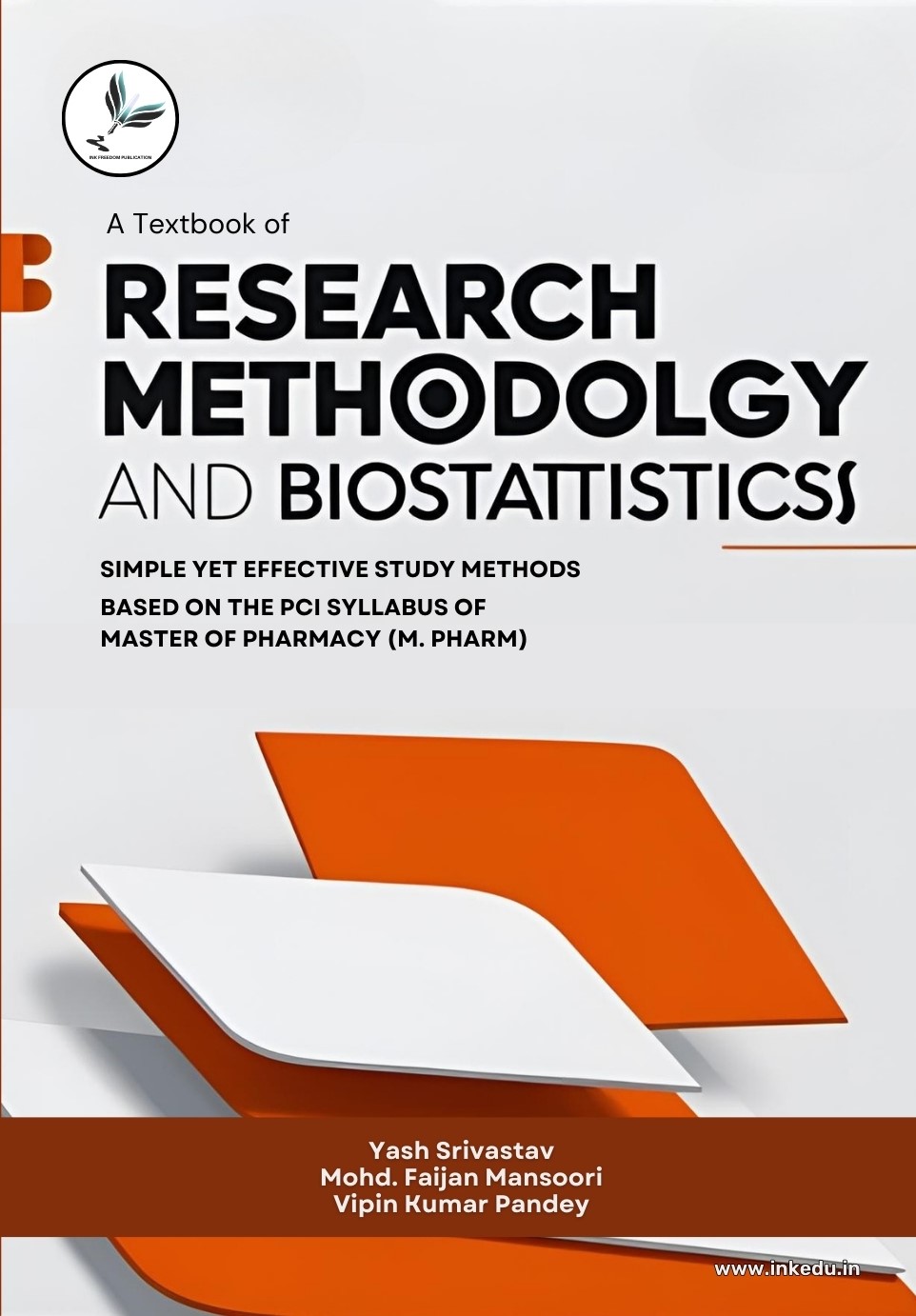
Research Methodology and Biostatistics
By Mohd Faijan Mansoori, Vipin Kumar Pandey, Yash Srivastav
Research Methodology and Biostatistics is a comprehensive and student-friendly academic resource tailored specifically for postgraduate pharmacy students, researchers, and professionals in allied health sciences. With the growing emphasis on evidence-based medicine, data-driven research, and ethical accountability, this book seeks to equip its readers with the foundational and practical knowledge necessary to undertake meaningful scientific inquiries, design robust research protocols, analyze data accurately, and understand the ethical imperatives of modern biomedical research. This book has been meticulously developed according to the syllabus of M.Pharm (Semester III) and is structured to cater to the academic and professional requirements of students, scholars, and educators. Each chapter is rooted in curriculum-mandated topics but goes beyond mere theory to offer long-form, human-centered explanations, real-world examples, and structured frameworks. Special care has been taken to ensure that the content is presented in an easy-to-understand language, with technical terms demystified and complex concepts broken down for clarity. One of the unique features of this book is its balanced coverage of both research methodology and biostatistics. The first half of the book deals with essential research fundamentals, including the nature and scope of pharmaceutical research, the process of designing a scientifically sound study, ethical considerations, literature reviews, sampling techniques, hypothesis formulation, and significance testing. It explores the practical difficulties researchers face in real-life settings and proposes feasible solutions based on current academic standards. The latter portion of the book is dedicated to statistical methods and tools that are crucial for interpreting research data and drawing valid conclusions. It covers parametric and non-parametric tests, correlation and regression analysis, and guidelines for choosing appropriate statistical techniques. Moreover, the text integrates examples, formulae, interpretation notes, and illustrative diagrams, making statistics more approachable to those from non-mathematical backgrounds. In addition to academic rigor, this book emphasizes ethical and regulatory standards by dedicating chapters to ethics committees, the Declaration of Helsinki, CPCSEA guidelines, and Good Clinical Practice (GCP). These sections aim to sensitize budding researchers to the moral responsibilities that come with scientific exploration and the global frameworks within which pharmaceutical research now operates. Each chapter is further subdivided into well-defined subheadings that logically organize the content and make navigation effortless. The inclusion of tables, flowcharts, suggested diagrams, real-life applications, and example-based discussions adds visual and contextual richness. Where needed, suggestions for SOPs (Standard Operating Procedures), case illustrations, and compliance checklists have been included to reflect real-world institutional practices. Whether you are preparing for exams, conducting research, or supervising postgraduate dissertations, this book provides a ready reference and instructional guide. What sets Research Methodology and Biostatistics apart is its unwavering commitment to educational accessibility. The tone is friendly yet academic, aiming to bridge the gap between dense scientific content and the learner’s understanding. Every concept is explained with empathy for the student’s perspective, whether it’s the anxiety of facing statistics or the uncertainty of designing an ethical research project for the first time. This book has also been written with flexibility in mind. It is equally useful for self-study, classroom instruction, and reference in project work. The modular structure allows faculty members to pick specific sections to match lecture plans, while students can revisit topics at their own pace. Educators will find it especially useful as a supplemental text for assignments, practicals, viva-voce, and seminars. In today’s data-driven and ethically conscious research ecosystem, competence in research methodology and biostatistics is not just desirable—it is essential. Students are expected not only to understand experimental design and statistical inference but also to critically appraise published literature, uphold ethical standards, and communicate their findings effectively. This book responds to that demand with clarity, depth, and responsibility. To conclude, Research Methodology and Biostatistics is more than a textbook; it is a mentor on paper. It encourages curiosity, supports rigorous inquiry, and nurtures academic integrity. It helps future researchers ask better questions, make evidence-based decisions, and contribute responsibly to the scientific community. By instilling a strong foundation in research ethics, statistical literacy, and methodological precision, this book aims to shape not only competent professionals but also reflective thinkers and ethical scholars in the pharmaceutical sciences. We hope that readers will find this book to be a valuable asset in their academic journey, and we welcome feedback that can help us improve future editions. As science continues to evolve, so too must the tools and texts that support it—and with this book, we aspire to be part of that ongoing evolution.
